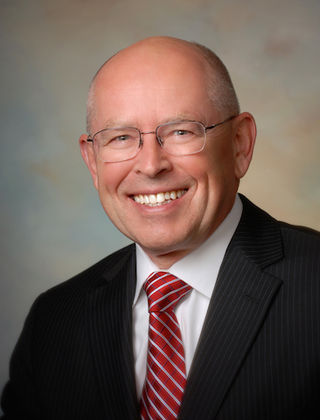
From the earliest days of the Christian faith, Christians have viewed marriage as a divinely blessed, lifelong, monogamous union between a man and a woman. However, while many Christians might agree with the traditional definition, the terminology and theological views of marriage have varied through time in different countries, and among Christian denominations.

John Richard Wimber was an American pastor, Christian author and musician. Initially ordained as a Quaker minister, he became an early, pioneering pastor of charismatic congregations, and a popular thought leader in modern Christian publications on the third person of the Christian Trinity, the Holy Spirit, and the Holy Spirit's action in modern churches through miraculous phenomena referred to as miracles, or signs and wonders. Wimber was a founding leader of the Vineyard Movement, a Christian movement that Ken Gulliksen began in the United States and that later became a wider denomination.

Wayne A. Grudem is a New Testament scholar turned theologian, seminary professor, and author. He co-founded the Council on Biblical Manhood and Womanhood and served as the general editor of the ESV Study Bible.

Christians for Biblical Equality (CBE) is an organization that promotes Christian egalitarianism and is headquartered in Minneapolis, Minnesota. CBE's Mission Statement reads: "CBE exists to promote biblical justice and community by educating Christians that the Bible calls women and men to share authority equally in service and leadership in the home, church, and world." According to its website, CBE "is a nonprofit organization of Christian men and women who believe that the Bible, properly interpreted, teaches the fundamental equality of men and women of all ethnic groups, all economic classes, and all age groups, based on the teachings of Scriptures such as Galatians 3:28: 'There is neither Jew nor Gentile, neither slave nor free, nor is there male and female, for you are all one in Christ Jesus' ."

The Council on Biblical Manhood and Womanhood (CBMW) is an evangelical Christian organization promoting a complementarian view of gender issues. According to its website, the "mission of The Council on Biblical Manhood and Womanhood is to set forth the teachings of the Bible about the complementary differences between men and women, created equally in the image of God, because these teachings are essential for obedience to Scripture and for the health of the family and the church." CBMW's current president is Dr. Denny Burk, a professor of biblical studies at Boyce College and director for The Center for Gospel and Culture at The Southern Baptist Theological Seminary. Its 2017 "Nashville Statement" was criticized by egalitarian Christians and LGBT campaigners, as well as by several conservative religious figures.
Quiverfull is a Christian theological position that sees large families as a blessing from God. It encourages procreation and abstaining from all forms of birth control and natural family planning in the pursuit of expanding the family. The position takes its name from Psalm 127:3–5, where children are likened to a gift and described as valuable, comparable to arrows in the hands of a warrior.

Complementarianism is a theological view in some denominations of Christianity, Rabbinic Judaism, and Islam, that men and women have different but complementary roles and responsibilities in marriage, family life, and religious leadership. Complementary and its cognates are currently used to denote this view. Some Christians interpret the Bible as prescribing complementarianism, and therefore adhere to gender-specific roles that preclude women from specific functions of ministry within the community. Though women may be precluded from certain roles and ministries, they are held to be equal in moral value and of equal status. The phrase used to describe this is "ontologically equal, functionally different".

Christian egalitarianism, also known as biblical equality. Christian egalitarians believe that the Bible advocates for gender equality and often allows women to be a part of the clergy. In contrast to other views such as complementarianisim and Christian patriarchy Egalitarians believe in a form of mutual submission in which all people submit to each other in relationships and institutions as a code of conduct without a need for hierarchical authority.

The roles of women in Christianity have varied since its founding. Women have played important roles in Christianity especially in marriage and in formal ministry positions within certain Christian denominations, and parachurch organizations. In 2016, it was estimated that 52–53 percent of the world's Christian population aged 20 years and over was female, with this figure falling to 51.6 percent in 2020. The Pew Research Center studied the effects of gender on religiosity throughout the world, finding that Christian women in 53 countries are generally more religious than Christian men, while Christians of both genders in African countries are equally likely to regularly attend services.

Recovering Biblical Manhood and Womanhood: A Response to Evangelical Feminism is a collection of articles on gender roles, written from an evangelical perspective, and edited by John Piper and Wayne Grudem. Crossway Books published the book in 1991 for the Council on Biblical Manhood and Womanhood (CBMW). CBMW, an international interdenominational evangelical Christian organisation, has a board and staff committed to a view of gender roles they dub complementarian. Recovering Biblical Manhood and Womanhood won Christianity Today's Book of the Year award in 1992.
The Danvers Statement is a statement of the complementarian Christian view of gender roles. It is not the product of any particular Christian denomination, but has been cited by the Southwestern Baptist Seminary, the Presbyterian Church in America, and the International Council for Gender Studies. It was first published by the Council on Biblical Manhood and Womanhood (CBMW) in Wheaton, Illinois in November 1988. Work on the statement began with "several evangelical leaders" at a CBMW meeting in Danvers, Massachusetts in December 1987. In 1989, a paid advertisement center-spread appeared in the January 13 issue of Christianity Today accompanied with the Danvers Statement.

1 Timothy 2:12 is the twelfth verse of the second chapter of the First Epistle to Timothy. It is often quoted using the King James Version translation:
But I suffer not a woman to teach, nor to usurp authority over the man, but to be in silence.
Douglas Winston Phillips is a Christian author, speaker, attorney, and homeschooling advocate who was once president of the now-defunct Vision Forum Ministries until he resigned due to an inappropriate relationship and allegations of sexual abuse. He advocates biblical patriarchy, creationism, homeschooling, the Quiverfull movement, and the family integrated church. He also worked for six years as a lawyer for the Home School Legal Defense Association (HSLDA).

Biblical womanhood is a movement within evangelical Christianity, particularly in the United States. It adopts a complementarian or patriarchal view of gender roles, and emphasizes passages such as Titus 2 in describing what Christian women should be like. According to author Rachel Held Evans, it is driven by the conviction that "the virtuous woman serves primarily from the home as a submissive wife, diligent homemaker, and loving mother."
The word kephalē appears some 75 times in the Greek New Testament. It is of considerable interest today because of differences of biblical interpretation between Christian egalitarians and complementarians as to the intent of the New Testament concerning roles of authority assigned biblically to husbands and wives. A prime example appears in Ephesians 5:21–24 where all Christians are told:

The stay-at-home daughter (SAHD) movement is a subset of the biblical patriarchy and biblical womanhood movements, particularly within the United States and New Zealand. Adherents believe that "daughters should never leave the covering of their fathers until and unless they are married." This means preparing to be a wife and mother, eschewing education outside the home and a career, and according to Sarah Stankorb writing for Marie Claire, "complete subservience to their father". For most stay-at-home daughters it involves a focus on the "domestic arts" such as cooking, cleaning and sewing. Julie Ingersoll suggests that the purpose of stay-at-home daughters is to "learn to assist their future husbands as helpmeets in their exercise of dominion by practicing that role in their relationship with their father."
Kevin N. Giles is an Australian evangelical Anglican priest and theologian who was in parish ministry for over 40 years. He and his family live in Melbourne, Australia. Giles studied at Moore Theological College in Sydney, Durham University, England and Tubingen University, Germany. He has a Doctor of Theology degree from the Australian College of Theology.
Christian manliness is a concept and movement that arose in Victorian Protestant England, characterised by the importance of the male body and physical health, family and romantic love, the notions of morality, theology and the love for nature and, the idea of healthy patriotism, with Jesus Christ as leader and example of truest manhood. The concept was first brought up in novels by the British Victorian writers Charles Kingsley and Thomas Hughes. Schoolmaster of the Rugby School, Thomas Arnold, was responsible for reforming the British public schooling system according to notions of biblical manhood. The Christian manliness movement can still be observed in the Anglosphere today, and although it shares a great deal with the notions and ideals originating from the Victorian era, it is distinct and shaped by the constraints and conditions of the modern post-industrial era. The American evangelical community places emphasis upon Christian manliness.
Voddie Tharon Baucham, Jr. is an American pastor, author, and educator. He serves as Dean of Theology at African Christian University in Lusaka, Zambia.

The Making of Biblical Womanhood: How the Subjugation of Women Became Gospel Truth is a book written by Beth Allison Barr and published in 2021 by Brazos Press, a division of Baker Publishing Group. The book discusses women in Christianity and argues that the restrictive position known as complementarianism is a recent development inconsistent with the historic roles of women in the church.







